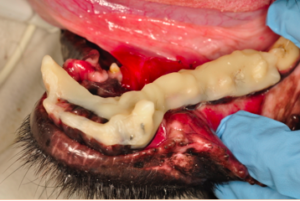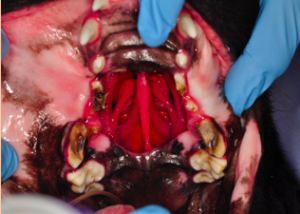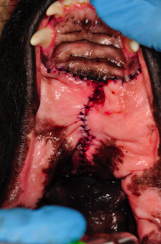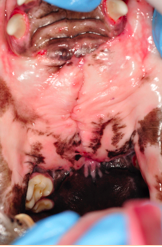Veterinary Oral Surgery: Advanced Care for Your Pet’s Oral Health
Many pet owners are surprised to learn that in veterinary medicine, a dentist also serves as an oral surgeon. Veterinary dentists undergo extensive specialized training in both dentistry and oral surgery, making them uniquely qualified to treat a wide range of oral and maxillofacial conditions. Because teeth, gums, and jaw structures are closely connected, having expertise in both fields provides a significant advantage when performing oral surgeries.
At Pet Dental Center, our highly skilled veterinary dental team has successfully treated a wide variety of oral conditions, utilizing state-of-the-art surgical techniques and advanced equipment to ensure the best possible outcomes for our patients.
What Types of Oral Surgeries Do Veterinary Dentists Perform?
Veterinary dentists handle complex oral and maxillofacial surgeries that go beyond simple extractions. Some of the most common procedures include:
✔️ Jaw Fracture Repair – Whether due to trauma, bone disease, or dental conditions, jaw fractures require careful stabilization and alignment to restore function and reduce pain. We use less invasive surgical techniques and biocompatible materials to promote proper healing.
✔️ Cleft Palate & Palatal Defect Repair – Congenital cleft palates or acquired palatal defects from trauma, tumors, or infections can make eating and breathing difficult. Our expertise in oral tissue reconstruction increases the likelihood of successful defect repair and restored oral function.
✔️ Impacted Teeth & Oral Cysts – Impacted teeth that fail to erupt properly can lead to pain, infections, and cyst formation in the jawbone. Early diagnosis and surgical intervention help prevent further complications.
✔️ Maxillofacial Tumor Excision & Reconstruction – We specialize in removing oral tumors while preserving as much function as possible. Our expertise in dental and bone structure allows for precise excisions and, when necessary, reconstructive surgery to restore oral function and appearance.
✔️ Surgical Management of Severe Periodontal Disease – When advanced periodontal disease leads to bone loss or deep infections, surgical intervention may be necessary to remove diseased tissue, save remaining teeth, or restructure the gums and jaw.
✔️ Temporomandibular Joint (TMJ) Surgery – TMJ disorders in pets can cause jaw pain, limited movement, and difficulty eating. Specialized surgical techniques can help restore normal jaw function.
Why Choose a Veterinary Dentist for Oral Surgery?
At Pet Dental Center, we combine advanced dental expertise with specialized surgical training, ensuring your pet receives the most precise and effective treatment available.
✔️ Advanced Equipment & Techniques – We use cutting-edge surgical instruments, digital imaging, and Cone Beam CT (CBCT) scans to plan and perform surgeries with the highest level of accuracy.
✔️ Minimally Invasive Approach – Whenever possible, we utilize less invasive procedures to reduce trauma, shorten recovery times, and improve healing.
✔️ Comprehensive Care – Because oral health impacts overall well-being, we take a holistic approach to treatment, addressing both immediate surgical needs and long-term oral health.
Is Oral Surgery the Right Choice for Your Pet?
If your pet has been diagnosed with an oral condition requiring surgery, or if you suspect they may have an oral issue causing pain or discomfort, we’re here to help. Our team at Pet Dental Center is committed to providing expert surgical care while ensuring your pet’s comfort, safety, and quality of life.
📞 Contact us today to schedule a consultation and discuss the best treatment options for your pet’s needs.

Non-invasive jaw fracture repair in a dog
This pet suffered from a palatal defect.

Large palatal defect in a dog

Repair of palatal defect

Two months following repair of palatal defect

